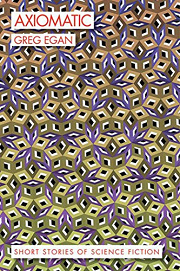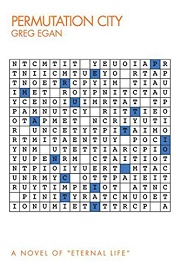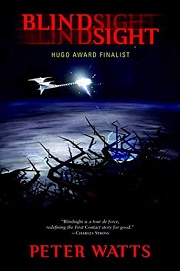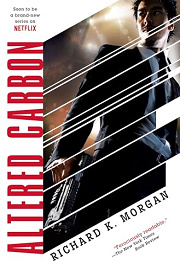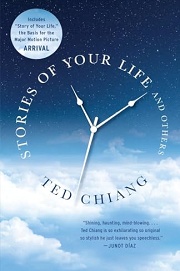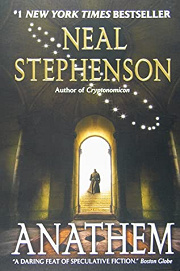Share your thoughts in a quick Shelf Talk!
Axiomatic by Greg Egan
Neural implants, paradoxes, and impossible choices—each story is a scalpel to the mind, asking what makes us human when technology rewrites the rules. Dazzling and disquieting, Axiomatic is hard science fiction at its sharpest.
Have you read this book? Share what you liked (or didn’t), and we’ll use your answers to recommend your next favorite read!
Love Axiomatic but not sure what to read next?
These picks are popular with readers who enjoyed this book. Complete a quick Shelf Talk to get recommendations made just for you! Warning: possible spoilers for Axiomatic below.
In Axiomatic, did you enjoy ...
... rigorous explorations of mind uploading and simulated reality?
Permutation City by Greg Egan
If the cortical swaps of “Learning to Be Me” and the tweakable ethics of “Axiomatic” thrilled you, you’ll love how Permutation City follows Paul Durham and a society of digital Copies as they stress‑test reality itself. Egan pushes computational physics and consciousness to the breaking point—when Durham launches the Autoverse and argues for dust‑theoretic immortality, it’s the same diamond‑hard, consequence‑driven speculation you enjoyed, just scaled up into a relentless, reality-questioning gauntlet.
... hard-SF thought experiments about consciousness and sentience?
Blindsight by Peter Watts
Drawn to the identity puzzles in “Closer” and the disquieting perspective shifts of “The Safe-Deposit Box”? In Blindsight, linguist‑turned‑observer Siri Keeton joins a posthuman crew—alongside the resurrected vampire commander Jukka Sarasti—to confront the alien enigma Rorschach. Watts dissects whether awareness has any survival value, mirroring the way “Axiomatic” dissects free will: every encounter, from the Chinese Room‑like scrambler studies to the ship’s unnerving mission logs, sharpens the blade on what ‘someone’ even means.
... body‑swapping tech that forces characters to confront continuity of self?
Altered Carbon by Richard Morgan
If “Learning to Be Me” and “The Safe-Deposit Box” grabbed you with their shifting selves and replaced identities, Altered Carbon puts those stakes into a brutal noir. Ex‑Envoy Takeshi Kovacs is resleeved into a new body to solve a ‘suicide’ that may be murder, and every clue twists around what’s lost—or fabricated—when minds jump substrates. The interrogation scenes, black‑market sleeves, and stack hacks echo the creeping doubts you felt when Egan’s protagonists questioned whether the ‘original’ was still inside.
... standalone, idea‑driven stories that each push a single radical concept to its limit?
Stories of Your Life and Others by Ted Chiang
If the tight, high‑concept punches of “The Hundred‑Light‑Year Diary” and “Axiomatic” worked for you, Chiang’s collection delivers that same precision. From the causality‑bending structure of “Story of Your Life” to the unsettling ethics in “Liking What You See” and the mathematical despair of “Division by Zero,” each tale builds a meticulous thought experiment and lands it with emotional clarity—much like Egan’s best mind‑bombs, but with a different, crystalline warmth.
... brain‑bending, meticulously reasoned speculation that rewards close attention?
Anathem by Neal Stephenson
If you relished the causality riddles of “The Hundred‑Light‑Year Diary” and the logical rigor across Axiomatic, Anathem gives you a whole civilization of scholar‑monks—Fraa Erasmus and company—using philosophy and math to grapple with multiverse physics. As their cloistered world collides with an extraterrestrial problem, the debates on consciousness, Platonic forms, and cosmology pay off like Egan’s most intricate thought experiments, with set pieces (the geometer, the concent’s Apert) that make the abstractions viscerally real.
Unlock your personalized book recommendations! Just take a quick Shelf Talk for Axiomatic by Greg Egan. It’s only a few questions and takes less than a minute.
